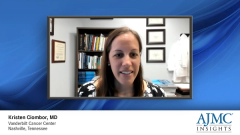
Identifying HER2 Overexpression in Patients with mCRC
Kanwal Raghav, MD, MBB, examines unmet needs in next-generation sequencing and barriers to coverage in this metastatic colorectal cancer discussion.
Episodes in this series

Kanwal Raghav, MD, MBBS: We don’t have a lot of data regarding the comparison of biomarker testing between the academic and community settings, least of all for HER2 amplification, knowing that this is a more recent biomarker. In our experience, patients coming from academic centers tend to have next-generation sequencing [NGS] panels, expanded panels, a little more than in the community setting, and they tend to get this sequencing done at an earlier stage in their treatment continuum. Hopefully we can bridge that divide and have HER2 testing, including NGS, becomes the standard of care for all patients across the academic and community settings.
There are tumor types where next-generation sequencing panels are covered more readily than in certain GI [gastrointestinal] tumors. In colorectal cancer, there are at least 4 or 5 molecular markers that you need to look for, with KRAS, NRAS, BRAF, HER2, MSI [microsatellite instability], and TMB [tumor mutational burden] all together. Doing them as separate tests is usually a much more cumbersome process and probably not an efficient or even financially responsible thing to do. NGS testing should be standard of care, but that hasn’t percolated to all the payer systems. Once you reach a certain threshold where you have many biomarkers that you can act on, it’s almost more efficient to do a NGS panel rather than taking each biomarker and addressing it separately.
In our center, we have an Oncomine-based NGS panel. However, a lot of our patients are also referred from outside, and there are a smattering of different platforms commercially available. Most of these panels cover the biomarkers of interest that we have when it comes to therapeutic applications. With HER2 specifically, we use NGS, a very good screening tool, but there are other options for ordering HER2. IHC, immunohistochemistry, is a protein expression–based analysis, as well as in situ hybridization, which is a gene amplification–determining test. Depending on the type of patient, any or all of these methodologies can be applied. We have also started looking at circulating cell-free tumor DNA and HER2 amplification as a part of that profile.
Transcript edited for clarity.
Newsletter
Stay ahead of policy, cost, and value—subscribe to AJMC for expert insights at the intersection of clinical care and health economics.












